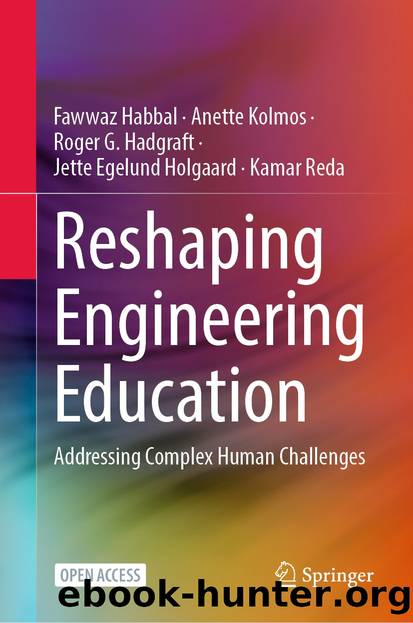Reshaping Engineering Education by Fawwaz Habbal & Anette Kolmos & Roger G. Hadgraft & Jette Egelund Holgaard & Kamar Reda

Author:Fawwaz Habbal & Anette Kolmos & Roger G. Hadgraft & Jette Egelund Holgaard & Kamar Reda
Language: eng
Format: epub
ISBN: 9789819958733
Publisher: Springer Nature Singapore
(2)
Active work is involved in thinking through and working conclusions out.
(3)
Considerations (evidence) are made to reason through to a conclusion.
(4)
Those involved have the authority to express their own interpretations, suggest new ways to approach areas of concern and reach their own conclusions (epistemic agency).
(5)
There is some degree of complexity in the reasoning involved.
(6)
Engagement moves beyond the individual or team to a broader community.
Therefore, inquiry implies a creative, collaborative, and active process that combines theory and practice for complex reasoning and epistemic agency. This approach to knowledge construction can be seen in scientific practices and that inquiry-based learning (IBL) is more often seen as practice within science education than within engineering education (Kolmos et al., 2021). In engineering education, IBL is more embedded in educational models that reflect professional practice (such as problem-based learning models) or parts of professional practice (such as design-based learning models).
In any case, inquiry-based approaches stand in contrast to approaches that are mostly concerned with corroborating dominant understandings or reconstructing what has previously been constructed. Inquiry can be seen a trajectory for transformative learning. Asking questions about a situation and seeking information as and when required becomes central, not only to knowing the why and what but also to creating new ideas of what could be (Holgaard et al., 2017). These ideas are evident in a situation where the dominant technological trajectory is far from reaching the ambition of a circular economy.
In engineering education, there is, however, no universal educational model to deal with the challenges of rethinking our society. It is really a question of how we can bring complexity into education in ways where students can learn to handle complexity, both in terms of analyzing and understanding the dynamics in complex problems, but also to find solutions. Learning can become a transformative process that moves beyond the individual, with an ambition to transform surrounding communities as well.
Transformations of society call for the part of inquiry focusing on new ideas and new knowledge, which underlines creativity as a central component in fostering change in technological systems in society. Csikszentmihalyi (1988) offers a systems approach to creativity and argues that dynamics in social institutions and cultural symbols must be in place in a system to foster creativity. Thereby, creativity builds on contextual knowledge. Cropley notes, it is a paradox that even though few would disagree that creativity is an essential component in technological innovation, âmany leaders, managers, professional practitioners, and educators are either apathetic to creativity or uncertain of how to exploit it in practiceâ (Cropley, 2016, p. 156).
From a social-constructivist perspective, Sawyer argued that creativity is basically a collaborative process (Sawyer, 2008), which is aligned with the understanding of technological innovation as a distributed process that includes several actors. It is a dialectic process between individual agency and collaboration in the inquiry process, between constructing and co-constructing new knowledge, new technologies, and new systems that include different technological trajectories. The collaborative nature of inquiry is important, as complexity and system approaches require organizations and interdisciplinary teams of engineers to work together.
Download
This site does not store any files on its server. We only index and link to content provided by other sites. Please contact the content providers to delete copyright contents if any and email us, we'll remove relevant links or contents immediately.
Special Education in Contemporary Society: An Introduction to Exceptionality by Richard M. Gargiulo & Emily Bouck(366)
Figuring Out Fluency in Mathematics Teaching and Learning, Grades K-8: Moving Beyond Basic Facts and Memorization by Jennifer M. Bay-Williams & John J. Sangiovanni(306)
Supporting Neurodivergent and Autistic People for Their Transition into Adulthood; Blueprints for Education, Training, and Employment by Danny Combs(261)
Clinical trial strategies for rare neurodevelopmental disorders: challenges and opportunities by unknow(253)
Daily Routines to Jump-Start Math Class, Elementary School by John J. SanGiovanni;(206)
Guiding Children's Learning of Mathematics (11th ed) by Leonard M. Kennedy Steve Tipps(202)
Robust High-Yield Methodologies for 2H and 2H15N13C Labeling of Proteins for Structural Investigations Using Neutron Scattering and NMR by Anthony P. Duff & Karyn L. Wilde & Agata Rekas & Vanessa Lake & Peter J. Holden(190)
The Lonely Little Cactus; A Story About Friendship, Coping and Belonging by Kelly-Ann Allen & Madeleine Griffith(181)
Accessing the General Curriculum by Nolet Victor;McLaughlin Margaret J.;(181)
Feedback in Online Course for Non-Native English-Speaking Students by Larisa Olesova(167)
Reshaping Engineering Education by Fawwaz Habbal & Anette Kolmos & Roger G. Hadgraft & Jette Egelund Holgaard & Kamar Reda(165)
Begin with the Brain by Kaufeldt Martha M.;(164)
Raising Self-Esteem in Primary Schools : A Whole School Training Programme by Margaret Collins(163)
Bullying Beyond the Schoolyard by Sameer Hinduja & Justin W. Patchin(158)
Multimedia in Education and Special Education by Onan Demir; Cari Celik(158)
Conquering Third Grade by Kristy Stark(154)
Removing College Price Barriers : What Government Has Done and Why It Hasn't Worked by Michael Mumper(148)
Negotiating Political Identities by Daniel Faas(146)
Understanding Supervision and the PhD by Moira Peelo(144)
